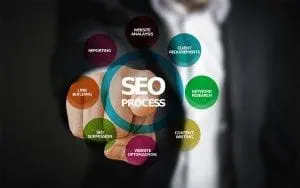Unless you’ve been living under a rock for the last two decades, you’re very familiar with Google. Google is everywhere. They’re either in your pocket as a phone (Android), on your desk as a laptop (Chromebook) or as your browser (Chrome), on your counter (Google Home), or all of the above. But Google’s humble beginnings started as just a search engine.
Google’s search engine continues to revolutionize how you find what you need. Long gone are searches with text only results. Google now offers diverse search results that include videos, images, local maps, ads and more. And a whopping 74% of people use a search engine for consideration and purchasing (research, comparison, transaction). If you’re not showing up in those results, know it or not, your business is slowly dying. Yes, you. Your business is dying.
It doesn’t matter what industry you are in. Everything circles back to your website at some point. Not even communications industries that can promote themselves through their own channels are safe. In a recent interview I did with Kevin Price on his nationally syndicated business show, Price of Business, he gives a perfect example that even his radio show would likely be long gone if he hadn’t jumped on the website bandwagon years ago. Like it or not, you need to be showing up in search engine results.
How do I get to the top of Google?
To climb the ranks on Google, you need search engine optimization (“SEO”). SEO encompasses all elements – technical and creative – to improve your website’s rankings, increase awareness in search engines, and boost traffic to ultimately increase sales. SEO aims to structure your site so that it resonates with both search engines and users.
In just a moment, I’ll tell you how to do just that… resonate with search engines and users.

(Pixabay / janjf93)
The first thing you need to be successful with SEO is realistic expectations. SEO is slow. Painfully slow.
What used to take six months to a year to rank highly now takes a year to two years. For really competitive industries, it is not unrealistic to take several years to rank. If you’re not mentally committed to fully completing all that’s involved in the effort that I’m about to outline, don’t even start.
Now that you know it is a slow play, you must prepare well in advance. Businesses that want to take advantage of the 2018 holiday season (yes, we’re talking Christmas already) need to start now. And if you’re gunning for a boost in sales over Valentine’s Day, you’re already too late.
The bottom line is that SEO takes time. It requires long-range planning and plenty of research. You’ll need to study your industry, sizing up the competition, deciding on keywords, and much more. Procrastination and SEO don’t mix.
Why does SEO take so long?
Search engine optimization involves a multitude of moving parts. Improving rankings and increasing conversions is a function of many factors. They build on each other and only show real progress when they have had a chance to gather sufficient momentum.
For one example, let’s say you distribute a press release. You’ve just released your newest widget, and you want to tell the world about it. The clock is now ticking.
- It takes you a day or two to draft your press release.
- You share your press release with colleagues for feedback.
- Days go by as you await feedback.
- Feedback comes in and you spend another day implementing revisions.
- A week or two has now gone by.
- You finally submit your press release.
- Another day or two goes by before it gets approved and distributed.
- Another day go by for the news to syndicate.
- Another day goes by for Google to index the news.
- A few days goes by for Google to digest the news and decide what to do with it.
- A few more days go by, and Google finally adjusts rankings based on your announcement.
Those few weeks that just went by is for one… single… press release. Now, multiply that equation by several other types of content and ranking factors.
- blogging daily/weekly
- getting other websites to feature your product/service/news
- creating videos
- designing infographics to showcase what you offer
- social media content and management
- backlinks

(Pixabay / geralt)
And that’s assuming that you know what topics you’re even going to write/design about. Often, the time spent researching topics takes significantly longer than writing/designing the actual piece.
How do you crate all of that content? Great question. The answer is after I share one more bit of information.
Don’t drink the Kool-Aid
Sound like too much to take on? It’s a lot. I empathize. The thing about SEO is that it all boils down to time. Either you’re putting in the time, or you’re paying for someone else’s time.
Unfortunately, as in any industry, some people in SEO are not the most honest, and they promise to get you on page one of Google overnight. This is a tempting sales pitch but not a feasible one. There is no such thing as instant gratification in SEO. And for added emphasis, if someone calls you and says they are from Google, hang up. Google doesn’t call anyone to solicit services. Especially not SEO.
Don’t get caught up in a sales pitch that promotes expedited SEO. It doesn’t exist. Period.
Be your own SEO rockstar – 4 easy steps to optimize ANY website:

(Pixabay / RyanMcGuire)
What do you need to optimize your site?
- Fix the site structure first
- Dial in the page speed after you know the structure is updated
- Start outreach to spur backlinks
- Start creating content
1 – Fix the site structure first
Make sure that your website has no broken pages, the SEO basics like title tags and meta descriptions are populated, and that the website loads well on mobile devices like phones and tablets.
Google offers a free Mobile-Friendly testing tool, here. If you want to see how your site looks on a smaller resolution without having to break out a dozen devices to test, try the Responsivator. Responsivator will render your site to preview it in various resolutions.
2 – Dial in the page speed after you know the structure is updated
Now that your site structure is fixed, make sure it loads quickly.
No one likes a slow loading website. Neither does Google. Use the free page speed tool at GTmetrix.com to see how you can improve the page speed of your site. Google also offers a PageSpeed Insights tool.
3 – Start creating content (weekly blogs, monthly infographics, videos, etc.)
- What are you going to blog about?
- What keywords are you going to target?
- What is my target demographic that I want to appeal to?
These are all items that you need to figure out before you start producing any content so that you maximize that content.
I recommend that you start by coming up with a 52-week content calendar to guide your writing. That way you know ahead of time what you can write about. Because, let’s be honest. If you think that you’re going to crank out a blog post every Friday morning on the fly, it isn’t going to happen. You need to strategize ahead of time, mass produce blogs one day a month, and then future date those posts accordingly. That way you can get in writer-mode and produce thorough, compelling content. Not bland, shotgun approach pitches.
What do you write about? Where do you start?
Start here – download this free topic listThis is a guide that took me weeks to develop and that I charge hundreds of dollars for. It’s yours. Free.
This a list of resources to help get your wheels spinning. It is not industry specific. It is a general list of topics to help spur ideas that you can segue into. Best of all, the topics are recurring so you can use this as a starting point year after year.
Once you create a roadmap of what you want to blog about, you can now easily develop content based on your weekly topics. But your topics isn’t written in stone. Don’t hesitate to be flexible. Things change in every industry, so be ready to adjust your calendar to accommodate timely topics.
Once you create content, don’t stop there. Repurpose your blogs into videos, infographics or other media to further diversify your website and what search engines see.
4 – Start outreach to spur backlinks
Now that you have a ton of great content, you need backlinks.
What is a backlink? When a website links to your site it is called a backlink.
Backlinks are what set Google apart from other search engines when they first came onto the scene. Google’s PageRank algorithm ranks the importance of a website based on the quantity of backlinks and the relevance of the sites providing the backlink. In short, the more links from relevant websites = better rankings.
Start reaching out to influencers in your industry. Tell them about your content. Mention the benefits of sharing your valuable content with their audience.
How do you find influencers?
There are (basically) two types of influencers online:
- blog/content influencers with a lot of readers
- social media influencers with a lot of followers
For content influencers, check out a program called pitchbox. Pitchbox helps you course blogs with high engagement. A great opportunity for you to reach out to those bloggers and share your content with them with the goal of them giving your credit via a backlink.
For social media influencers, check out Shout. Shout identifies influencers within your target niche and helps you understand their follower base to find those that can drive the most exposure for you.
Another great way to get links on sites is to see where your competitors already have inks. Then, do as the Romans do and get your site linked there, too.
Try checking out your competitors’ sites and their backlinks on OpenLinkProfiler.org. Open Link Profiler will tell you what websites are linking to your competitors. This will expose websites that you can potentially submit your own links to or ask to contribute to in return for a backlink.

(Pixabay / janjf93)
People have high expectations for SEO, and, indeed, it is one of the best techniques available for improving online exposure and increasing conversions. Search engine optimization can be the key to your company’s success as long as you fully utilize its capabilities and give it time to work. Good things come to those who wait, and successful SEO is no exception.